This post is also available in:
![]() Français (French)
Français (French) ![]() Русский (Russian)
Русский (Russian)
By Elena Lysak
Assia Benziane is Deputy Mayor for women’s rights and equality of the Eastern Parisian suburb Fontenay-sous-Bois. At the age of 17, she became the founder of several schools for women in Algeria. Today, this radiantly positive 26-year-old woman is actively involved in local politics. She is the elected member of the Municipal Council; she also runs her own association in France. Assia talks to us about her mission to promote equal rights and opportunities for all women and girls and she sheds light on how to live life with no regrets.
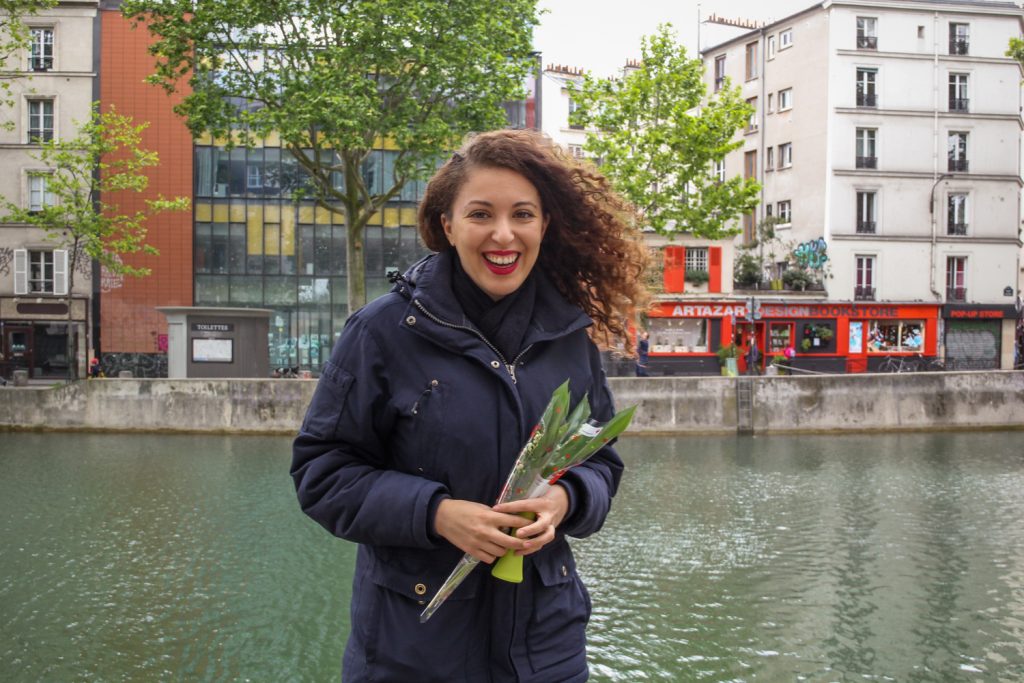
“I am the door to knock on for women who need help.”
Assia, you are Deputy Mayor for Women’s Rights and Equality in Fontenay-sous-Bois. Why did you choose to pursue a career in politics?
In a way, it happened by coincidence. From the age of 17, I was involved in community life. I also went to Algeria to open schools for women who didn’t have access to education.
When I returned to France, I got a call from the Mayor of Fontenay-Sous-Bois, the municipality I live in. He invited me to engage with the work of the City Council. I have to admit that I knew nothing about politics, I’ve never been interested in politics, so it was absolutely new to me.
I accepted the invitation and later I was appointed the Deputy Mayor for women’s rights and equality. Back then, I was the youngest Municipal Council member in France.
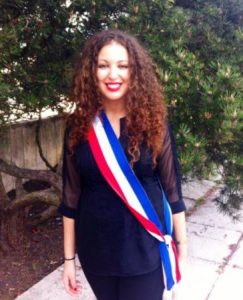
What was your first role in the City Council?
I started as a councilor in the Municipal Council and the very beginning of my career was the time of intense learning for me. There’s no actual training on how to do this job. I didn’t know how to process the files, how to talk to people, how to receive them. By the time I got promoted to the role of Deputy Mayor, I’ve learned a lot and I was feeling more confident.
Why were you the right candidate to take care of women’s rights?
I had been fighting for women’s rights for a long time. This is the cause I really care about. The Mayor and other members of the Municipal Council knew about this, they also heard about my education project in Algeria.
Did they create a new role for you in the Municipal Council?
No. In Fontenay-sous-Bois, we have a mission to promote equal rights and opportunities for all women and girls. They used to have someone in charge for this area before me, I just filled the vacancy.
Which responsibilities do you have in your role of Deputy Mayor?
I work on local campaigns, take care of communication. We have a Municipal Program to follow. I ensure that we keep our promises given in the campaign. We have the total of 6 years to ensure that we advance with the program. But of course, there also are more general things to observe, for example, the International Women’s Day.
Did you push forward any new ideas?
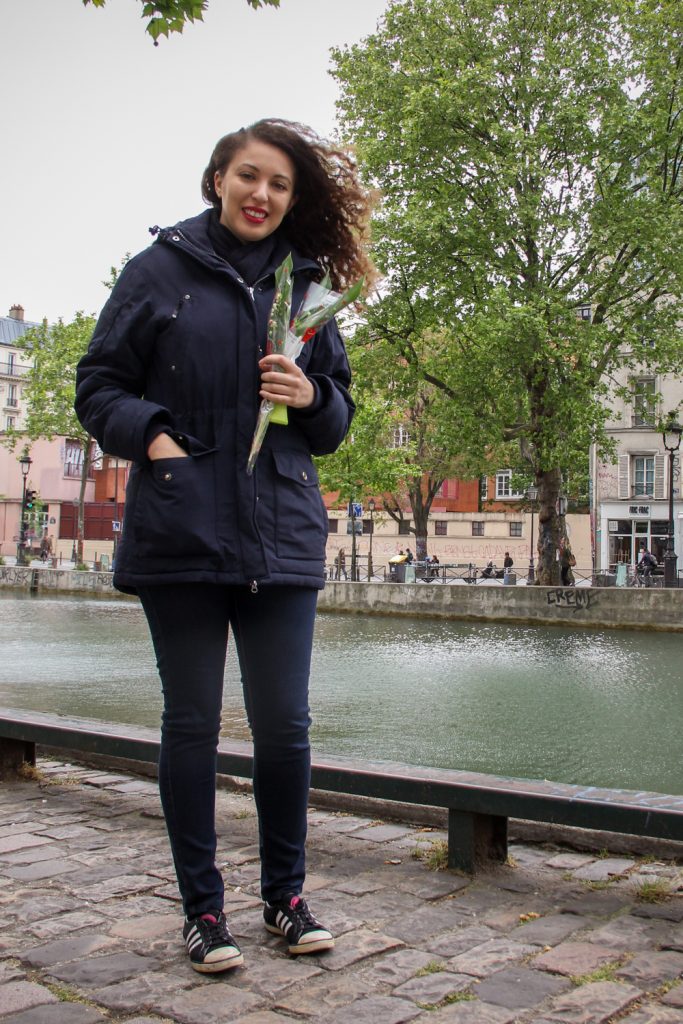 I proposed a project on prevention of some common women’s diseases, for example on prevention of endometrioses. This wasn’t part of the Municipal Program, but I find that it is important to address this problem.
I proposed a project on prevention of some common women’s diseases, for example on prevention of endometrioses. This wasn’t part of the Municipal Program, but I find that it is important to address this problem.
Besides, I am advocating for the right to free medical abortion. Women are entitled to have a choice.
It is important to mention because the number of abortion-providing medical centers in the region of Ile-de-France has declined. They closed 130 such medical centers in France in the last 10 years.
We welcome women in a difficult situation to come and talk to us.
Is there a big demand for abortions in France?
Not directly, however, our last report on women’s rights and gender equality showed that we have the same abortion rate in our town as the overall pregnancy termination rate in France. There are situations when certain groups of women may need to have this option.
Our town has a local Health Centre. Women can take a free appointment with a Gynaecologist there. They would receive advice and recommendations from a specialist, and the doctor can help them make a decision in this extremely difficult question.
This is very interesting. Statistics aside, there are always personal stories. What do you learn from women who come to see you?
I often receive female victims of violence and domestic abuse. This year alone, I’ve seen about ten women, it’s quite a big number for a small town like ours. But of course, every story is different. I met a woman who was physically abused by her husband but she didn’t dare to go to the police.
Why do women choose to come to the Municipal Council with this kind of questions? Why wouldn’t they seek help from a dedicated association?
In Fontenay we deal with all kinds of abuse, it is not only about physical abuse, it’s also about financial disputes, some personal problems. All women and all cases are different, sometimes it is difficult for them to find an association that would be taking care of exactly the kind of problem they have.
And this is where we can help them. We want women to feel encouraged to come to see us and seek help if they need it. We work with partner associations in our town, so we can help to find the right one that would further support them.
Women can also go to see a doctor, or to the Police station, but they often choose to come to see me instead. I am the door to knock on for women who need help. I always accept every appointment.
It’s not my direct responsibility, but I feel that it is my mission to help women in need.
It is important not to leave anyone without help. That woman who was scared to go to the police on her own needed my support. I went there with her and helped her to report the abuse. It was important for her. These things happen, we should be aware of them.
“I wanted to be involved.”
You received financial support to launch an education project when you were 17. Tell me how it happened.
I started very early. When I was 14. I was helping younger kids to do their home assignments, I also picked up kids from school, you know, this kind of things. Later I joined the association “Resist, Insist, Persist” in Fontenay-Sous-Bois. At the age of 17, I went to Brazil to help to renovate schools. When I returned, I started dreaming of having my own project. I said to myself: “I also want to be involved.” But I did not really know in what area I could help.
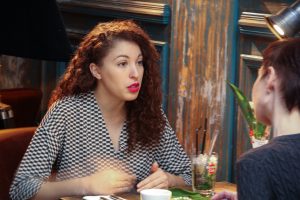 Some months later, I went to visit my birth country, Algeria, where I met my neighbor Nabila. We are the same age. We got to talk about my bac (High school diploma) and she said to me:
Some months later, I went to visit my birth country, Algeria, where I met my neighbor Nabila. We are the same age. We got to talk about my bac (High school diploma) and she said to me:
“You are so lucky. Here, we don’t even have school.”
I was shocked. When I asked my mother, she confirmed that it was the reality. I answered her: “Oh no, we can’t leave it this way! We have to do something about it!”
There’re so many such Nabila in Algeria! In big cities women go to school, they may go to the university but there is almost nothing for girls in a small village like ours.
Girls in the villages finish their primary education and then they need to go to school in a different place. The new school can be far, and if their parents don’t have money, there are not that many options left for them. That is why my mother and I decided to bring the school to our village, and to the neighborhood villages.
Amazing! How many schools did you open?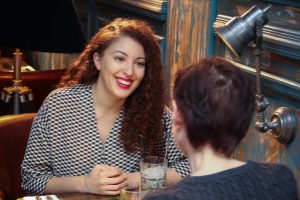
We opened 9 schools. We started with just one class in our living room. A retired school teacher agreed to participate in our project. And then we’ve got 70 women signed up for the classes in the range of ages from 13 to 77. It was super exciting but back then we even didn’t have the money.
How did you convince the village women that it was a good idea?
My mother and I decided that the initiative should come from the women. We went door to door telling that we wanted to organize a meeting for women. At the meeting, we asked women what kind of education they would love to have, and the most told us that they wanted to learn reading to be able to read labels on kids’ medications, you know?
What happened after?
I got back to France and told the story to people from the “Resist, Insist, Persist” association. They encouraged me to start my own initiative, with which I went to the ELLE Foundation, an organization that supports and promotes women’s education around the world.
A week later I got an appointment there. Thanks to their financial support I was able to open 9 real schools in the old mosques that we got renovated for this purpose.
Incredible! What do they teach in these schools?
Reading and writing in French, English, and Arab, offered at different levels. We’ve educated more than 500 women.
How much money did you receive from the Elle Foundation for your project?
I calculated how much money I needed to get pens, notebooks, and boards to write, so I was asking for 2.000 euros. But the ELLE Foundation saw a lot of potential in our initiative, and I was offered 20.000 euros to develop the project.
Our objective was to help women to get out of their villages, to become more independent. It was beautiful to see that those who went to our schools, created an association of their own, they organized cooking classes, nights out in town etc. They had never done things like that before.
Just imagine, I met a woman who had never seen the sea in her life, whereas she was living just 2 hours away from the beach.
So many women there didn’t even dare to try to do things, they shut themselves from the world, it’s kind of self-censorship they impose upon themselves.

What about their men, what did they say?
It went really well with the men in those villages. They gave us their permission to open schools, they were very happy. They also offered to help.
“The Algerian women are free, we do whatever we want.”
You accomplished so many incredible things at the age of just 17. I bet that your family is really proud of you.
They are sort of proud of me but we stay humble. We acknowledge when something went well but we don’t talk about it all the time.
Do your mother and your two sisters share your feminist ideas?
Yes, sure. Even my family in Algeria is very open about these ideas, women in our family are free, they express themselves, they go out without their husbands, you know, this kind of things.
That’s so great to hear. Tell me about your family, what do your parents do for a living?
My mother is a childminder, and my father is a chef. They met in Algeria. There was a moment, when the situation with terrorism in Algeria escalated, my parents decided to move to France. I just turned one at that time.
My mother is French, her family lives here, the move wasn’t too difficult for her. I believe, it was more challenging for my father. He used to be a teacher in Algeria. After moving to France, he got a job of a dishwasher in a restaurant but he climbed up the career ladder, and now he is a chef in the Italian restaurant.
Everything is possible when you want it.
What education did you receive?
I am a trained air hostess. No relation to politics whatsoever.
Wow! Why did you choose this field?
I absolutely love traveling. I’ve always been passionate about seeing places, meeting people, discovering new cultures. When I got elected to the Municipal Council, I lost the freedom to travel often, I should be 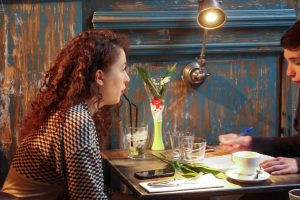 available on site, so I had to make my choice. But I don’t regret it because I chose the right thing.
available on site, so I had to make my choice. But I don’t regret it because I chose the right thing.
Besides, I am still working as train attendant on French long-distance trains TGV.
Is it accepted to choose this kind of occupation for a woman in Algeria?
We are free to do whatever we want to do, you know.
Assia, may I ask you about your cousin Sohane, a young woman who got killed at the age of 17 a few years ago?
Yes. My cousin got murdered in 2002. Her death was a shock here in France, and in fact, in the whole world. She was burnt alive in Vitry, the Parisian suburb. It is a tragedy, and when it happened, we realized that women’s rights are not automatically granted, awful things are still happening, and they can happen even here in France. Sadly, violence against women is the reality in the whole world.
I have to admit that it’s truer for certain countries. I dream of full equality and freedom for all women everywhere in the world.
“I don’t have days off, really, not that many.”
You are doing so many things. How do you organize your life?
I actually hardly ever take days off, really rarely. Either I work, or I am in the Municipal Council. I also manage my association here in France. This association is my project, called ABC, we redistribute clothes: first, we collect old clothes, and then we send them to those in need. It also takes time.
This leaves me really little time for my private life, for family life. But I absolutely love my life. I like it the way it is. I have my own traditions, for example, every year I celebrate my birthday in a different country.
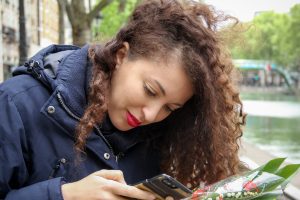 What about your daily schedule?
What about your daily schedule?
It all depends on my planning. I usually start my days relatively late, at 10 am. I check the emails from my secretary, my messages, I am very active on social media. When I get up, I get a glass of water. I don’t have breakfast, I prefer to eat lunch. I don’t drink coffee or anything that may make me addictive. I don’t drink alcohol, and I don’t smoke.
So healthy! Do you work out?
No. I don’t really feel the need to. My life is quite active even without sport.
“Success doesn’t happen on its own… not without people who support us every day.”
Let’s talk success. At the young age, you have already done so many great things. How successful do you believe you have been so far?
I can’t really estimate how successful I have been but I am really happy with my life, and for me, it’s kind of success. I am also happy with who I am and what I’ve done.
In my ideal life, I want to be involved in many different activities.
Aren’t you afraid to get lost if you do too many things?
Well, it can happen but I am very organized. I love organizing and planning in advance, and I use different tools to control my work process.
What do you use?
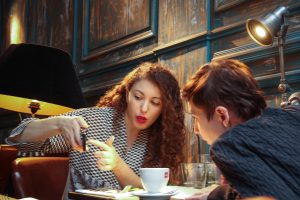
I use my calendar. At work in the City Council, it’s my secretary who is taking care of my planning. I don’t loose time this way. Besides, I write things down on my phone, I use my iPad, I always know where I should be and what to do.
I believe that success doesn’t happen on its own, we need other people who support and help us on the daily basis. In this regard, my secretary helps me enormously with my work in the City Council.
What’s the secret of your success?
Dare to do things. We, women, are more likely to build imaginable barriers, to believe that we are less capable than men. We should dare to destroy those barriers, and ideally, we should be surrounded by people ready to help with our projects. I have always got great support from my mother, I am working with her together on my ABC project.
What in life is the most important for you?
My family.
Which women inspire you?
Michele Obama, Malala Yousafzai, Beyonce. And of course, my mother, she inspires me a lot.
What about men?
My father in the first place. That’s about it.
“Equality is important for the whole world, for women, men, for the whole society.”
What is your biggest dream?
I have a dream to be very committed to what I am doing but also to have fun in life. We have only one life, I feel we should do as many positive things as possible.
We should always try new things and never regret. Never ever.
Mistakes happen. My mistakes don’t upset me, they are part of my experience, I learn from them.
Would you like to give a piece of advice to our readers?
I’ve already done it:
Always dare to try new things. Always!
We, women, should also stop that restricting self-censorship. We have everything we need to succeed.
If you had a daughter or a son, what would you tell them?
What would I say?
Go ahead!
Yes. Do what you like, do what you want!
Let’s imagine you are a magician. How would you change the world?
I would create full equality for women and men in the whole world – this will be magical! When we have the full equality, everyone in the world would benefit from it – women, men, and our entire society.
Thank you, Assia. Where can people find you online?
Social media:
Useful Links, Notes, and Resources
Places
Inspiring Women
Organizations
- ELLE Foundation
- Association “Insist, Resist, Persist”
English Text: Natalia Yurevich
You may also like: Chiara Condi – Led By HER to Success